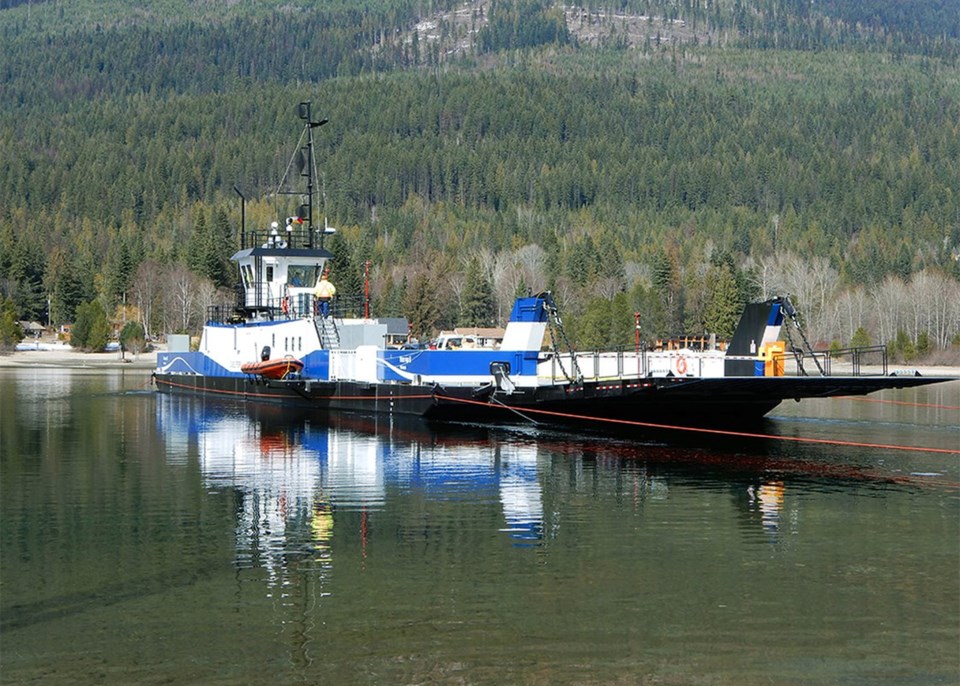VANCOUVER — A resident of Glade, B.C., says the small community is "on a knife's edge" despite a temporary reprieve from disruptions in the cable ferry service serving as its only link to "basic necessities of life."
Deborah Johnson said Monday that no one in the 120 or so households in the Kootenay-area village feels assured, despite Western Pacific Marine saying the ferry it operates there will be running as normal this week "and indefinitely."
The announcement comes after the company applied for and received a stay from the province's Labour Relations Board of an earlier ruling that would have allowed union workers to expand their strike action on the free Kootenay Lake and river crossings, starting Monday.
That would have resulted in disruptions for ferry service at Glade and nearby Harrop, about 57 kilometres to the northeast.
Western Pacific Marine said a new hearing was being planned for a reconsideration of the original order, and the board will announce the hearing dates next week.
Labour Relations Board chair Jennifer Glougie said the decision takes into account the company's argument that "reduced service levels" in an expanded strike action "may present an immediate threat to the health, safety and welfare" of residents in the communities served by the ferries.
"There is no dispute that the Glade and Harrop ferries are the only means of accessing the communities they serve," the decision said. "There are no alternative roads which might ultimately connect the affected communities to the highway."
Johnson said there are no services in Glade, and residents rely on the ferry with the capacity of about eight vehicles to access everything from schools and health care to work and basic necessities.
"There are no grocery stores, there are no pharmacies, there are no jobs, there are no schools, there are no medical facilities," she said. "You probably could find somebody to buy eggs from. That is the extent of the services that we have in Glade.
"So yeah, it's been extremely stressful."
The BC General Employees' Union, which represents the ferry workers who have been on strike since Nov. 3, said Monday that it does not have an official statement in response to the development while its members are "awaiting the outcome of the hearing on the stay."
The union is seeking wage increases, scheduling adjustments and extended benefits for auxiliary workers.
In a meeting held on Dec. 31 that Glade residents posted on YouTube, union representative Mike Fenton said members have been trying to reach a new deal for eight months with Western Pacific Marine after the last agreement expired in April.
Western Pacific Marine said on its website that the company has agreed to the union's "proposed wage percentage increase over a three-year term" as well as "increased extended health benefits, allowances and safety equipment."
"Despite these efforts, the BCGEU has rejected the proposals put forward to reach a collective agreement," the statement said.
The job action was to escalate Monday following a B.C. Labour Board ruling on Dec. 27 granting the union approval to reduce service of the Harrop-Procter ferry to eight round trips daily and 16 round trips for the Glade ferry.
The possibility of escalating strike action set off protests from residents and businesses in the communities of Harrop, Procter and Glade as the dispute threatened to reduce services and cut some off completely.
Johnson said the possibility of only 16 round trips for Glade on an eight-vehicle ferry means many people who do not qualify for essential-travel reasons may be stranded on either side, not being able to access vital services or not being able to return home once they've crossed.
People who know the sailings will not serve them are making plans to cross the river in small boats, she said.
"If they go forward with the strike as the essential service order is currently written, I think there is a high likelihood that somebody could die, whether somebody dies crossing the river or somebody dies as a traffic accident on one side or the other."
This report by The Canadian Press was first published Jan. 6, 2025.
Chuck Chiang, The Canadian Press

